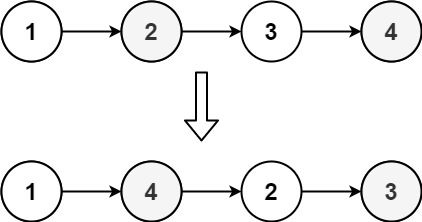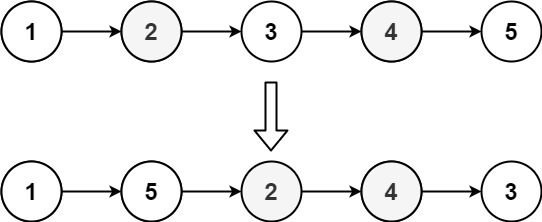| comments | difficulty | edit_url | tags | ||||
|---|---|---|---|---|---|---|---|
true |
Medium |
|
You are given the head of a singly linked-list. The list can be represented as:
L0 → L1 → … → Ln - 1 → Ln
Reorder the list to be on the following form:
L0 → Ln → L1 → Ln - 1 → L2 → Ln - 2 → …
You may not modify the values in the list's nodes. Only nodes themselves may be changed.
Example 1:
Input: head = [1,2,3,4] Output: [1,4,2,3]
Example 2:
Input: head = [1,2,3,4,5] Output: [1,5,2,4,3]
Constraints:
- The number of nodes in the list is in the range
[1, 5 * 104]. 1 <= Node.val <= 1000
We first use fast and slow pointers to find the midpoint of the linked list, then reverse the second half of the list, and finally merge the two halves.
The time complexity is
# Definition for singly-linked list.
# class ListNode:
# def __init__(self, val=0, next=None):
# self.val = val
# self.next = next
class Solution:
def reorderList(self, head: Optional[ListNode]) -> None:
fast = slow = head
while fast.next and fast.next.next:
slow = slow.next
fast = fast.next.next
cur = slow.next
slow.next = None
pre = None
while cur:
t = cur.next
cur.next = pre
pre, cur = cur, t
cur = head
while pre:
t = pre.next
pre.next = cur.next
cur.next = pre
cur, pre = pre.next, t/**
* Definition for singly-linked list.
* public class ListNode {
* int val;
* ListNode next;
* ListNode() {}
* ListNode(int val) { this.val = val; }
* ListNode(int val, ListNode next) { this.val = val; this.next = next; }
* }
*/
class Solution {
public void reorderList(ListNode head) {
ListNode fast = head, slow = head;
while (fast.next != null && fast.next.next != null) {
slow = slow.next;
fast = fast.next.next;
}
ListNode cur = slow.next;
slow.next = null;
ListNode pre = null;
while (cur != null) {
ListNode t = cur.next;
cur.next = pre;
pre = cur;
cur = t;
}
cur = head;
while (pre != null) {
ListNode t = pre.next;
pre.next = cur.next;
cur.next = pre;
cur = pre.next;
pre = t;
}
}
}/**
* Definition for singly-linked list.
* struct ListNode {
* int val;
* ListNode *next;
* ListNode() : val(0), next(nullptr) {}
* ListNode(int x) : val(x), next(nullptr) {}
* ListNode(int x, ListNode *next) : val(x), next(next) {}
* };
*/
class Solution {
public:
void reorderList(ListNode* head) {
ListNode* fast = head;
ListNode* slow = head;
while (fast->next && fast->next->next) {
slow = slow->next;
fast = fast->next->next;
}
ListNode* cur = slow->next;
slow->next = nullptr;
ListNode* pre = nullptr;
while (cur) {
ListNode* t = cur->next;
cur->next = pre;
pre = cur;
cur = t;
}
cur = head;
while (pre) {
ListNode* t = pre->next;
pre->next = cur->next;
cur->next = pre;
cur = pre->next;
pre = t;
}
}
};/**
* Definition for singly-linked list.
* type ListNode struct {
* Val int
* Next *ListNode
* }
*/
func reorderList(head *ListNode) {
fast, slow := head, head
for fast.Next != nil && fast.Next.Next != nil {
slow, fast = slow.Next, fast.Next.Next
}
cur := slow.Next
slow.Next = nil
var pre *ListNode
for cur != nil {
t := cur.Next
cur.Next = pre
pre, cur = cur, t
}
cur = head
for pre != nil {
t := pre.Next
pre.Next = cur.Next
cur.Next = pre
cur, pre = pre.Next, t
}
}/**
* Definition for singly-linked list.
* class ListNode {
* val: number
* next: ListNode | null
* constructor(val?: number, next?: ListNode | null) {
* this.val = (val===undefined ? 0 : val)
* this.next = (next===undefined ? null : next)
* }
* }
*/
/**
Do not return anything, modify head in-place instead.
*/
function reorderList(head: ListNode | null): void {
let slow = head;
let fast = head;
while (fast && fast.next) {
slow = slow.next;
fast = fast.next.next;
}
let next = slow.next;
slow.next = null;
while (next) {
[next.next, slow, next] = [slow, next, next.next];
}
let left = head;
let right = slow;
while (right.next) {
const next = left.next;
left.next = right;
right = right.next;
left.next.next = next;
left = left.next.next;
}
}// Definition for singly-linked list.
// #[derive(PartialEq, Eq, Clone, Debug)]
// pub struct ListNode {
// pub val: i32,
// pub next: Option<Box<ListNode>>
// }
//
// impl ListNode {
// #[inline]
// fn new(val: i32) -> Self {
// ListNode {
// next: None,
// val
// }
// }
// }
use std::collections::VecDeque;
impl Solution {
pub fn reorder_list(head: &mut Option<Box<ListNode>>) {
let mut tail = &mut head.as_mut().unwrap().next;
let mut head = tail.take();
let mut deque = VecDeque::new();
while head.is_some() {
let next = head.as_mut().unwrap().next.take();
deque.push_back(head);
head = next;
}
let mut flag = false;
while !deque.is_empty() {
*tail = if flag {
deque.pop_front().unwrap()
} else {
deque.pop_back().unwrap()
};
tail = &mut tail.as_mut().unwrap().next;
flag = !flag;
}
}
}/**
* Definition for singly-linked list.
* function ListNode(val, next) {
* this.val = (val===undefined ? 0 : val)
* this.next = (next===undefined ? null : next)
* }
*/
/**
* @param {ListNode} head
* @return {void} Do not return anything, modify head in-place instead.
*/
var reorderList = function (head) {
let slow = head;
let fast = head;
while (fast.next && fast.next.next) {
slow = slow.next;
fast = fast.next.next;
}
let cur = slow.next;
slow.next = null;
let pre = null;
while (cur) {
const t = cur.next;
cur.next = pre;
pre = cur;
cur = t;
}
cur = head;
while (pre) {
const t = pre.next;
pre.next = cur.next;
cur.next = pre;
cur = pre.next;
pre = t;
}
};/**
* Definition for singly-linked list.
* public class ListNode {
* public int val;
* public ListNode next;
* public ListNode(int val=0, ListNode next=null) {
* this.val = val;
* this.next = next;
* }
* }
*/
public class Solution {
public void ReorderList(ListNode head) {
ListNode slow = head;
ListNode fast = head;
while (fast.next != null && fast.next.next != null) {
slow = slow.next;
fast = fast.next.next;
}
ListNode cur = slow.next;
slow.next = null;
ListNode pre = null;
while (cur != null) {
ListNode t = cur.next;
cur.next = pre;
pre = cur;
cur = t;
}
cur = head;
while (pre != null) {
ListNode t = pre.next;
pre.next = cur.next;
cur.next = pre;
cur = pre.next;
pre = t;
}
}
}
